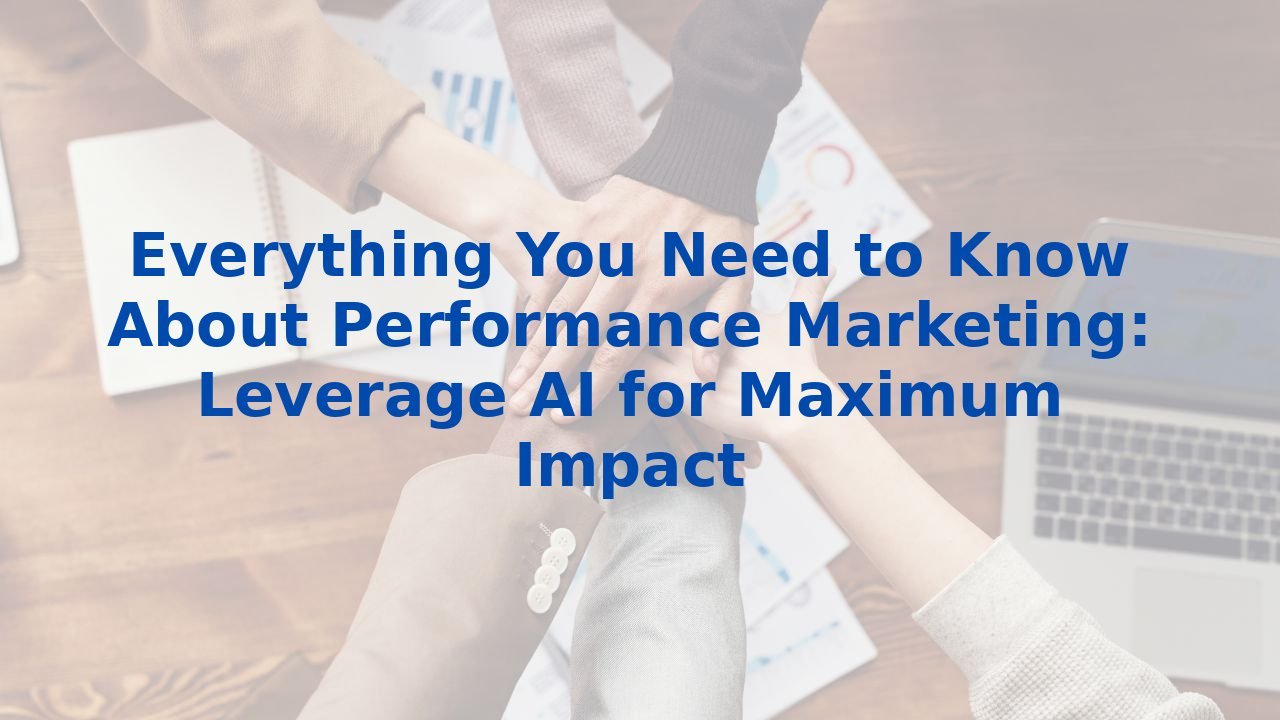Everything You Need to Know About Performance Marketing: Leverage AI for Maximum Impact
The Essence of Performance Marketing: Leveraging AI for Enhanced Efficiency
Introduction
Performance marketing is transforming the landscape of digital marketing. By focusing on measurable results, it allows businesses to assess their investments directly through consumer actions—be it clicks, leads, or sales. Unlike traditional marketing, which often pits accountability against brand awareness, performance marketing reels in a tight rein on your resources through marketing technology (martech), optimizing campaigns while maintaining an eye on effectiveness.
Key Features of Performance Marketing
Pricing Structure
A hallmark of performance marketing lies in its pricing structure. Here, advertisers pay only for completed actions, eliminating the traditional model based on impressions or placements. Imagine harnessing Pay Per Sale (PPS) or Cost Per Acquisition (CPA) models in your e-commerce ventures; you would invest only when a consumer takes the desired action. This creates a win-win scenario that galvanizes both advertisers and publishers to deliver optimal results.
Measurable Outcomes
The ability to track metrics like cost per acquisition (CPA), return on ad spend (ROAS), and conversion rates is another standout feature of performance marketing. These figures are integral to decoding the effectiveness of your campaigns. This data-driven approach supports ongoing optimization, granting you the power to invest marketing dollars wisely.
Channels
Performance marketing opens doors to various channels, including:
- Search Engine Marketing (SEM): Ads driven by user clicks.
- Affiliate Marketing: Partnerships where commission is based on sales generated.
- Social Media Advertising: Targeted ads on platforms like Facebook and Instagram aimed at driving actions.
- Email Marketing: Engaging campaigns crafted for conversions through personalized messaging.
Benefits of Performance Marketing
Higher ROI
The emphasis on clear, measurable actions often results in a higher return on investment compared to conventional advertising. With every focus aimed at achieving specific outcomes, your efforts translate directly into financial gains. There’s nothing quite like a strategy that directly impacts your bottom line.
Scalability
Performance marketing also offers unparalleled scalability. By allowing campaigns to be adjusted based on real-time performance data, marketers can optimize resource allocation with ease. This nimble approach is vital in today’s fast-paced digital realm, adapting seamlessly to shifting market conditions.
How AI Enhances Performance Marketing
Data Analysis
Enter AI, a game-changer for maximizing performance marketing. With AI’s capability to analyze extensive data sets in real-time, marketers gain insights into consumer behavior and campaign outcomes that were previously unfathomable. The takeaway: swift decision-making leads to optimized strategies.
Personalization
AI doesn’t just revolutionize analysis; it enables deep personalization. Algorithms driven by AI allow businesses to tailor marketing messages according to individual consumer data. When integrated thoughtfully, your social media ads can resonate on a personal level, thereby amplifying engagement and conversion rates.
Automation
While mundane tasks consume precious hours, AI comes to the rescue through automation. Campaign optimization, lead scoring, and email marketing can be autonomously managed, liberating teams to engage in more strategic and creative efforts. The efficiency boost is palpable, and human errors become a relic of the past.
Predictive Analytics
With AI’s predictive capabilities, businesses can forecast future campaign performance grounded in historical data. It shifts the strategy from reactive to proactive, preparing marketers for what lies ahead. By being ahead of the curve, you can seize opportunities and mitigate risks before they arise.
The Importance of Training Employees for AI
While the mechanics of AI tools are undeniably powerful, their success hinges on how effectively your team utilizes them. Building a culture of learning through AI training programs brings several compelling advantages:
Understanding AI Tools
Your employees must grasp not only the capabilities but also the limits of AI. Training programs pave the way for staff to master the use of AI for data analysis, personalization, and automation, effectively bridging the gap between potential and practice.
Data Interpretation
To leverage AI insights for strategic decisions, employees need to understand data interpretation. Educational initiatives strive to equip workers with the skills to analyze trends and derive actionable strategies. It's all about making data-driven decisions count.
Integration with Existing Systems
AI tools must mesh with existing marketing systems for a seamless experience. Training focuses on technical integration, ensuring that your performance marketing workflows run effortlessly.
Conclusion
In a world where performance marketing represents a dynamic, data-driven approach to success, leveraging AI tools for data analysis, personalization, automation, and predictive analytics becomes imperative. The path to higher ROI and scalability is clear. By investing in training programs for your workforce, you’re not just empowering them but also supercharging your business for the inevitable future. Equip your organization now to establish a resilient and effective performance marketing strategy that commands attention in the digital marketplace.



